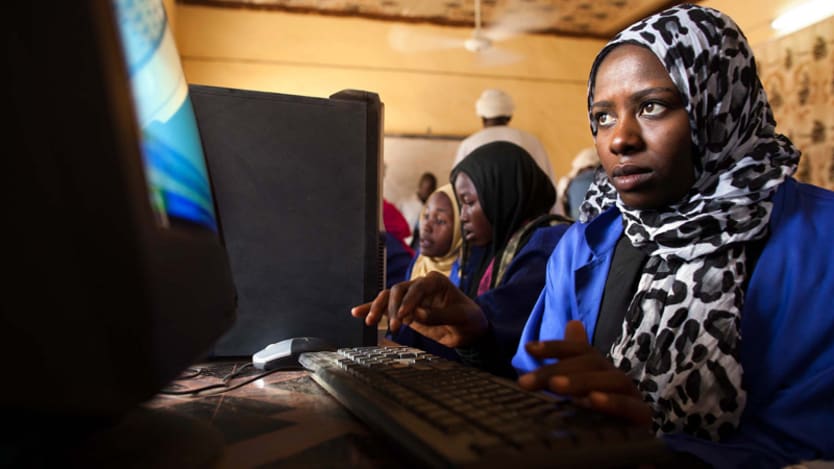
DUBAI — While educators are right to be skeptical about some education technology, evidence-driven home-grown technologies that seek to support rather than replace teachers have a key role to play in driving learning across Africa, according to education experts, investors, and entrepreneurs.
The potential role of ed tech in addressing the “learning crisis” facing developing countries was high on the agenda at the Global Education & Skills Forum in Dubai this week, which showcased a number of gadgets including the latest virtual reality and artificial intelligence softwares, and also saw the launch of the “Next Billion EdTech Prize” to help scale three promising innovations.
However, a number of conversations and sessions at the conference underscored that many educators remain unconvinced by the promise of ed tech as a solution to the systemic challenges that mean 264 million children are out of school in developing countries. A further 600 million are in school but learning little, according to the World Bank.
Speaking during one session, Justine Cassell, associate dean for technology strategy and impact at Carnegie Mellon University, called on teachers to “appropriate technology” such as virtual reality and artificial intelligence, and not let “technology tell you what to do,” in order to avoid a “nightmare dystopia” future in which teachers are replaced by robots and children play with virtual friends.
Indian ed tech expert Shankar Maruwada also warned that technology must be regulated if it is to work in the interests of society.
Devex spoke to entrepreneurs, investors, and experts to get their views on how and why ed tech can be a force for good in the sector.
Evidence driven
See more stories on the future of education:
► Minding the gaps at the Global Education & Skills Forum
► Could schools take a cue from the health force?
► 'Nobel prize for teaching' shines spotlight on innovative methods
► New $75,000 prize boosts tech solutions to education challenges
“One of the main reasons ed tech is not working is that it’s been so much about retrofitting rather than being transformative,” according to Carla Aerts, director of futures at the UCL Institute of Education.
This is partly in response to resistance from governments, parents, and teachers, she said, who have tended to see education as “fairly fixed for a variety of reasons such as politics and parents wanting stability,” and have thus “co-created a rhetoric of retrofitting.”
Technology companies are also at fault for tending to emphasize the “tech” at the expense of the “ed,” Aerts told Devex, and for leaving learners out of the equation.
“We need to redefine what we’re doing here because we have to be first and foremost learning and teaching driven, rather than technology-driven, and within that be much more focused on user-centricity,” Aerts said.
But the ed tech expert said she is hopeful for the future, and that the sector is starting to see a new generation of “technologies that are learning driven and teaching informed, and which engage with an evidence mindfulness.”
The United Kingdom’s Department for International Development has also joined the buzz around evidence-driven ed tech, announcing plans to launch an “EdTech Research and Innovation Hub” to “help decision-makers from developing countries make informed decisions about investing in EdTech and provide a platform for engagement between governments, tech companies and innovators,” in its new education strategy paper published last month.
However, experts warned at the time that this should not be used as a vehicle for pushing U.K. ed tech products, instead fostering local solutions.
Local solutions
“You won’t solve the problems in African education by conventional means; we think that technology is definitely part of the answer,” said Jamie Martin, founder of Injini, Africa’s first ed tech accelerator. However, Martin was also clear that simply transplanting technology from other parts of the world will not be effective: The continent needs evidence-based, local solutions, he said, something which has been lacking in many past interventions.
“I think rightly there is skepticism … and education people are worried that people from Silicon Valley and other tech communities look at education and think that’s something we can fix by building a whizzy app,” Martin added.
Launched last year, Injini offers $50,000 in capital combined with mentoring to promising Africa-based for-profit education innovators, so far funding eight companies from South Africa, Ethiopia, Kenya, Tanzania, and South Sudan. All of these companies are led by Africans, although some have expat co-founders, Martin said. Injini recently opened its second call for applications, which closes on May 3.
In response to these justified concerns, Martin said Injini looks for evidence that an element of an enterprises’ model could work, or has worked, in another setting. The accelerator also tends to focus on low-cost, low-tech solutions which have a “relevant cost and technology price point” for the market. This tends to rule out the kinds of “incredibly fancy” and “frivolous” ed tech innovations you might see in the American or European markets, Martin said.
“All of our innovations are working on things which address a mass population,” he said, offering the example of Mtabe. One of Injini’s first cohort, Mtabe has created an online Wikipedia-style resource, written by teachers, for the Tanzania school curriculum, which can then be searched using an AI engine. Users can text a question to the server and it will text back the answer.
According to Martin, this is a good example of why focus and funding needs to go toward locally developed and appropriate solutions.
“This is a good example of something which would never get created in America or the United Kingdom because everyone has Google or Wikipedia and you would only think of that if you’re from Tanzania,” Martin said.
Injini’s winning enterprises also seek to “empower teachers, not replace them … We like things which supplement school or strengthen teachers to do a better job,” according to Martin, which often means favoring low-tech solutions since the majority of Africa’s teachers are over the age of 40, which can create resistance to technology in the classroom.
“There’s a growing awareness that if we do technology in a smart way it could be effective,” he said.
Cost-effective and scalable
AcceleratED is one of Injini’s investees. It runs a teacher training and mentoring platform in Ethiopia, working with government and private schools to offer low-cost but hands-on, in-person and online professional development support for teachers. It was developed to address endemic problems around teaching, with many schools hiring unqualified staff in the face of huge shortages but then being unable to offer quality, affordable professional development training.
“We rescue teachers and students from boring, scary, and ineffectual classrooms,” according to founder Ravi Shankar. In 2017, the group worked with 20 schools and approximately 500 teachers.
The model works by training former teachers to become coaches, who then work closely with school teachers and offer one-to-one advice and coaching. In the United States, teacher coaching has been shown to be the single most effective education intervention, but it is also the most expensive, Shankar explained. In response, AcceleratED is developing a low-cost alternative in which teacher coaches can be trained in less than three weeks and, instead of relying on years of experience, can use AcceleratED’s platform. The platform is built on “data points from thousands of teachers and students to build a predictive engine for any coaching situation.”
By “building an expert coach on a mobile app,” AcceleratED is able to charge schools one-tenth of the price charged by other teacher coaching programs in Ethiopia, he said. It also takes the burden off the teacher, since the coach handles the technology.
Challenges persist
However, while the experts Devex spoke to were optimistic that ed tech has the potential to play an important role in driving education gains across developing countries if done in a “smart” way, entrepreneurs still face a number of barriers.
Martin and Shankar spoke of a lack of technical capabilities across the continent as something that is holding back ed tech development.
“One of the biggest things that holds our companies back is the inability to hire good technical people,” Martin explained. In response, Injini is putting more emphasis on technical skills within the founding teams when selecting its next cohort of ed tech companies to support, he said.
In addition, Martin pointed to a lack of local investment for education in Africa, making companies reliant on U.S. and European investors. “Local investors are so conservative and not willing to take risks and still see the education sector as something you can’t make money in,” he said.
Shankar said a major challenge for AcceleratED has been engaging with the Ethiopian government. While corruption can be an issue when engaging with governments in some countries, he said, this has not been the problem in Ethiopia. But Shankar said the company has had to be patient and careful to engage with government actors at all levels, as well as other stakeholders.
“You need to have patience and you need to make it fit for the Ethiopian context,” Shankar said, adding “we built everything from the bottom up, got the right people in place, engaged with everyone, and were clear that we’re not dropping something from the American context into Addis Ababa.”








